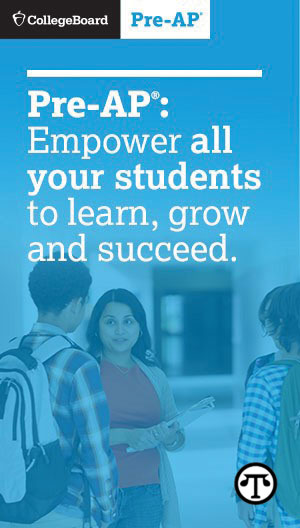Expanded Pre-AP Access Coming To A School Near You Next Fall

(NAPSI)—Exciting changes for students are coming to the College Board’s Pre-AP Program in the 2020-21 school year. After two years of partnership with more than 200 schools, the Pre-AP Program is expanding nationwide, making the program available to all schools and giving more students the opportunity to grow and prepare for college and career.
Pre-AP courses provide students with critical thinking skills through grade-level appropriate content and instruction. Students learn more deeply by spending time on the topics and skills that matter most. Pre-AP courses are designed to get all students ready for their next steps: future high school classes, including Advanced Placement, where they can earn college credits; college courses; and career.
Here are three ways schools and students can benefit from implementing Pre-AP.
Multiple Subjects to Explore
The Pre-AP Program launched in the 2018-19 school year with eight courses:
• Pre-AP Algebra 1
• Pre-AP Biology
• Pre-AP English 1
• Pre-AP World History and Geography
• Pre-AP Arts: Dance
• Pre-AP Arts: Music
• Pre-AP Arts: Theatre
• Pre-AP Arts: Visual Arts
Beginning in fall 2020, Pre-AP will also offer courses in Pre-AP English 2, Pre-AP Geometry with Statistics, and Pre-AP Chemistry.
All courses are based on shared instructional principles to ensure that every student can build critical thinking skills across multiple subjects, including:
• Close Observation and Analysis: Students use texts, art, graphs, maps, problems, and other source materials to learn close observation before being asked to explain and then apply or evaluate.
• Evidence-Based Writing: Students craft claims in science, analyze historical sources, explain math problems, demonstrate reading comprehension, and critique artistic choices in the arts. They first focus on sentences before progressing to paragraph and essay writing.
• Higher-Order Questioning: Students are encouraged to grapple with questions that spark curiosity and promote productive critical thinking skills so they can succeed on unfamiliar, new tasks.
• Academic Conversations: Students must be engaged, active participants in their learning and will have opportunities to compare, critique, debate, and build upon others’ ideas.
Course and Assessment Resources
Spending more time on fewer concepts provides greater opportunities for academic success for all students. Pre-AP teachers can tailor their instruction to best suit students’ specific needs. Lessons may include classroom activities, texts, sources, data sets, and practice to motivate, engage, and challenge students.
Pre-AP also includes digital learning checkpoints and performance tasks for monitoring students’ growth and informing instruction.
Support for Teachers
All Pre-AP teachers attend professional learning workshops either in-person or online. Teachers can explore and engage with Pre-AP shared instructional principles, course framework, content areas of focus, and sample model lessons. They can also work with their peers to plan and build their own course materials to better support students throughout high school.
For more information about Pre-AP, visit: https://pre-ap.collegeboard.org/join?excmpid=oc392-pr-01-naps.

“Exciting changes for students are coming to the College Board’s Pre-AP Program. Pre-AP courses provide students with critical thinking skills through grade-level appropriate content and instruction. http://bit.ly/38hmpAC”
